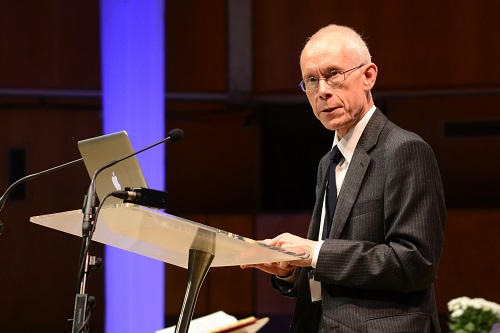 Autumn 2017 is a key period in the Reformed Christians’ calendar. We celebrated the centenary of the ordination of Constance Coltman in September, and October marks 500 years since German monk, Martin Luther challenged the teachings and practices of the Roman Catholic Church, says the Revd John Proctor, General Secretary of the United Reformed Church.
Autumn 2017 is a key period in the Reformed Christians’ calendar. We celebrated the centenary of the ordination of Constance Coltman in September, and October marks 500 years since German monk, Martin Luther challenged the teachings and practices of the Roman Catholic Church, says the Revd John Proctor, General Secretary of the United Reformed Church.
'I want to unpack with you some luggage that comes with the name Reformed. Luther caught the mood of the times, and set in motion a wave of change that historians now call the Reformation,' John said. 'The most obvious result was a major transformation of church life, initially in northern and western Europe, and particularly, so far as we are concerned, in this island, then eventually in many other countries across the world.
A lot of URC people may wonder what the German Reformation and Luther’s commemoration has to do with us. In a multi-cultural Church, some will point out that these European events don’t link well with their story; the people from whom they are descended were not living in Europe at the time. But some luggage we carry comes out of that story. When we start to unpack our church life, there are labels on the luggage that point back to the Reformation in various ways.

Gathered church - In some strands of the URC tradition, there has been a distinctive emphasis on the way we worship – not like the Established Church. As a result, Christians wanting to worship in a particular way may have created the impression that our Church is characterised by coming in rather than going out. Yet we are also church when we are spread out, servants of Christ when we are immersed in the life of the wider community. If we always see church as a gathering and never as a scattering, our cup may be half-full, but our commitment may, if we are not careful, be half-empty.
Justification by faith – this gives us reason for being ecumenical, because it says that different groups of Christians who share faith in Jesus belong together. It also gives us reason for evangelism.
Priesthood of all believers. The words speak to us about the life of the church. All are equal; there is no rank; office is a matter of service rather than status; ministry is a practical arrangement, not an essential doctrine; we take decisions together. That leads on to the thought that together we have a priestly role in God’s world. Together we share and offer something of God’s holiness. Together we are committed to making a difference.
 Eldership – this idea has been around since the Reformation, and at its best is a marvellous pattern of Christian service. Elders often know the local community better than the minister does. They know more about the community’s story, its tensions, its changes, its problems and its pains. They are the portholes of the church. They have roots in the world and they lead the church. They keep us grounded, real and involved. I am immensely proud of our elders, and of the practice and order of eldership.
Eldership – this idea has been around since the Reformation, and at its best is a marvellous pattern of Christian service. Elders often know the local community better than the minister does. They know more about the community’s story, its tensions, its changes, its problems and its pains. They are the portholes of the church. They have roots in the world and they lead the church. They keep us grounded, real and involved. I am immensely proud of our elders, and of the practice and order of eldership.
These are four valuable pieces of luggage. They carry much of our spiritual wealth, and we draw much from them. But none of these four is just about us. In different ways, they all send us out and remind us that we are a people with a mission, called to serve God’s world and to live the life of Jesus within it.'




